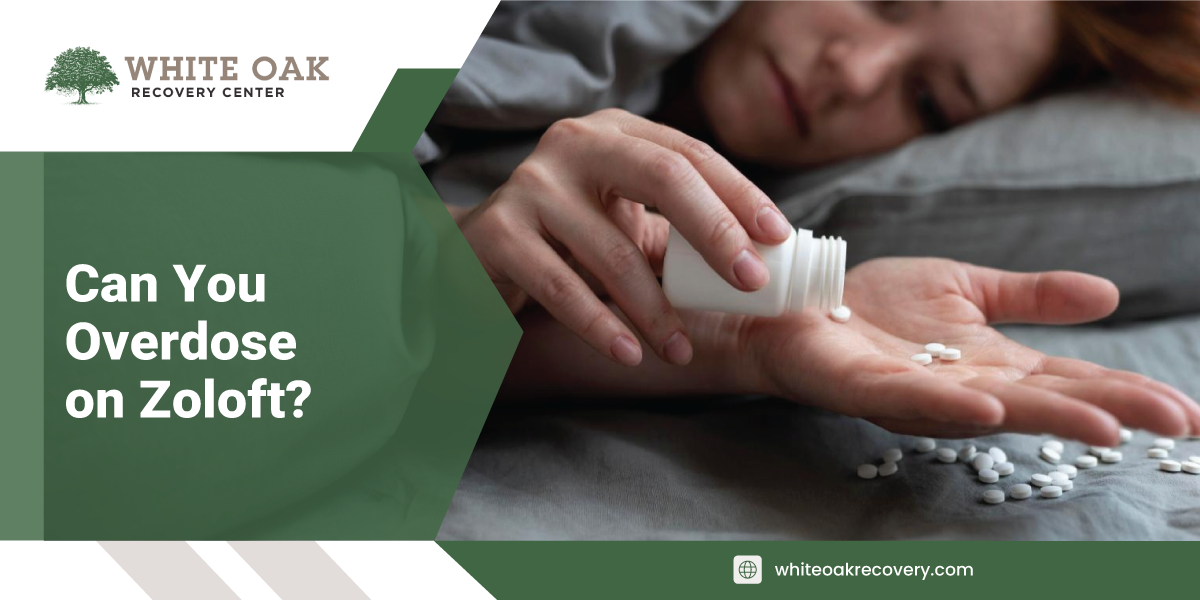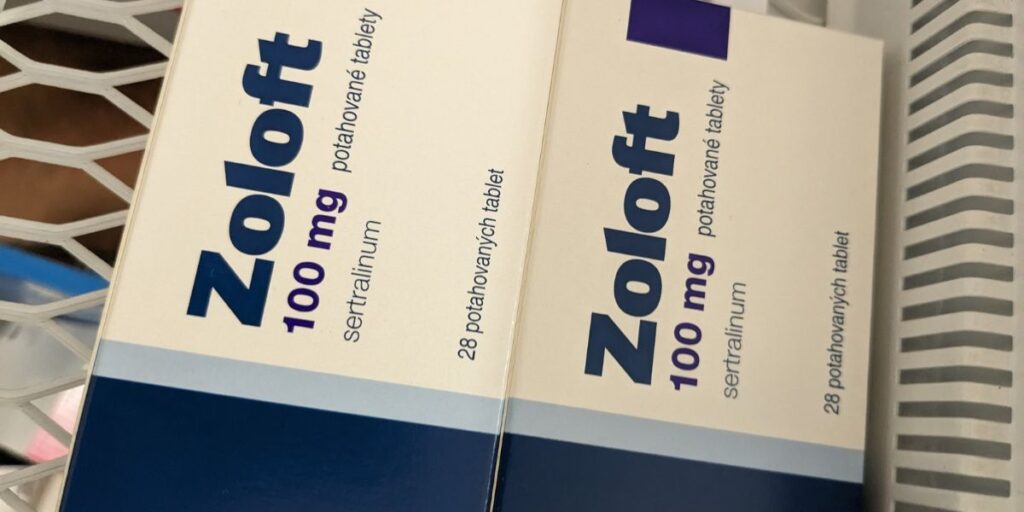Can You Overdose on Zoloft?


Medical Writer:
Reviewer:

Johnny Kim
Executive Psychotherapist
Medical Writer:
Reviewer:

Johnny Kim
Executive Psychotherapist
Zoloft, or sertraline, is one of the most commonly prescribed medications for treating depression and anxiety. This selective serotonin reuptake inhibitor (SSRI) is known for helping people manage the symptoms of various mental health conditions by adjusting the levels of serotonin in the brain. However, like many prescription medications, it carries potential risks if misused.
While Zoloft has proven beneficial for those with major depressive episodes and anxiety disorders, taking too much of the medication or using it in a way not directed by a doctor can lead to various severe health problems. The consequences can range from mild discomfort to life-threatening conditions such as an overdose on Zoloft.
Table of Contents
Toggle
What Is Zoloft?
Zoloft, also known by its generic name sertraline, is a selective serotonin reuptake inhibitor (SSRI). This type of prescription medication is commonly used to treat various mental health conditions such as depression, anxiety disorders, obsessive-compulsive disorder (OCD), and post-traumatic stress disorder (PTSD). Zoloft works by increasing the amount of serotonin—a neurotransmitter that influences mood— in the brain, helping improve symptoms of these conditions.
Sertraline is commonly prescribed because of its relatively mild side effects compared to older antidepressants. However, just like any other antidepressant, taking higher doses than prescribed can lead to severe health complications. It is essential to understand the risks of improper use, including potential overdose, particularly when exceeding the recommended dosage.

Zoloft Side Effects
Like most antidepressant medications, Zoloft can cause side effects, even when taken as prescribed. These side effects can vary depending on the person, the dosage, and the length of use. Common side effects of Zoloft include:
- Nausea
- Dry mouth
- Dizziness
- Fatigue
- Sleep disturbances
- Diarrhea
- Loss of appetite
- Shaking or tremors
In more severe cases, Zoloft can cause side effects, including suicidal thoughts, particularly when the dose of Zoloft is first adjusted or increased. For some people, especially younger adults, the onset of mental health conditions such as depression or anxiety may worsen before improving.
It’s crucial to talk to your doctor about any side effects or concerns you may have while taking Zoloft. They can adjust the dosage or suggest alternative treatments to reduce the risk of complications.
Serotonin Syndrome
Another side effect caused by Zoloft is serotonin syndrome, which can occur when the brain’s serotonin levels are too high. It’s a dangerous condition that can happen mainly when combining Zoloft with other medications or taking higher doses than prescribed.
Symptoms of serotonin syndrome include:
- Agitation
- Mental status changes
- Hallucinations
- High blood pressure
- Rapid heart rate
- High body temperature such as fevers
- Vomiting and diarrhea
Without timely treatment, serotonin syndrome can become fatal. Treatment often involves IV fluids, sedation, and medications to stabilize the patient’s heart rate and blood pressure.
Can You Overdose on Zoloft?
Yes, it is possible to overdose on Zoloft, mainly if someone takes higher doses than what has been commonly prescribed or if the medication is combined with other substances like alcohol or other prescription medications. Overdose risks increase significantly if a person takes more than the recommended amount or uses it outside its prescribed use to treat depression or other mental health conditions.
An overdose of Zoloft can result in potentially life-threatening symptoms and must be addressed immediately. If you suspect someone has taken more Zoloft than prescribed, it’s essential to call 911, visit the nearest emergency room as quickly as possible, or seek medical attention immediately. In some cases, the immediate administration of activated charcoal or stomach pumping may be necessary to reduce the absorption of the drug.
Taking a high dose of Zoloft can lead to severe antidepressant overdose symptoms, which will require emergency medical intervention. This highlights the importance of adhering strictly to your doctor’s prescription and avoiding the temptation to take more medication to “feel better” faster.
Zoloft Overdose Symptoms
Recognizing the signs of a Zoloft overdose is crucial for taking timely action. The symptoms of Zoloft overdose include:
- Nausea and vomiting
- Drowsiness or extreme lethargy
- Tremors or uncontrollable shaking
- Confusion or disorientation
- Fast or irregular heart rate
- Seizures
- Coma
When experiencing a major depressive episode, some people may have suicidal thoughts, increasing their risk of intentional overdose. Poison centers and emergency room staff are well-equipped to manage such emergencies, and getting medical attention can prevent irreversible damage or death.
If you suspect someone has overdosed on Zoloft, quick action can help mitigate the damage and prevent further complications. Below are the immediate steps you should take.
- Call 911 immediately
- Administer activated charcoal
- Monitor breathing and heart rate
- Visit the emergency room
- Contact a poison center

Zoloft Addiction Treatment at White Oak Recovery Center
If you or someone you care about is having trouble with Zoloft, White Oak Recovery Center (WORC) can help. They provide caring, patient-centered, and proven treatment programs.
Each treatment plan is made to help with specific substance use disorders, like prescription medication addiction. This ensures it meets your unique needs. At WORC, the focus is on comprehensive care that helps people overcome addiction to Zoloft and other antidepressant medications.
The dedicated team of professionals at WORC offers medical care and therapy services. They help manage withdrawal symptoms and address mental health issues. They also provide emotional support and treat the root causes of addiction.
WORC provides medical detox with around-the-clock medical supervision to stay safe during withdrawal. Our accredited treatment center also provides medication-assisted treatment, dual diagnosis treatment, and cognitive-behavioral therapy (CBT), among other treatments and therapies.
By seeking help at White Oak Recovery Center (WORC), people can find the care they need to overcome their addiction and reclaim their lives.
Contact WORC today. Our treatment specialists are eager to get you the help you deserve for a meaningful life in recovery.

Am I covered for addiction treatment?
Your insurance may cover treatment. Call now for an entirely free and confidential assessment. Recovery starts with a phone call.

- Singh, Hardeep K., and Saadabadi, Abdolreza, “Sertraline.” StatPearls: National Library of Medicine, Feb. 2023.
- Lau, G.T., and Horowitz, B.Z., “Sertraline Overdose.” Acad Emerg Med., Feb. 1996.
- Brendel, D.H., et al., “Massive Sertraline Overdose.” Ann Emerg Med., Nov. 2000.
- Bruggeman, Clare, and O’Day, Carla S., “Selective Serotonin Reuptake Inhibitor Toxicity.” StatPearls: National Library of Medicine, Jul. 2023.
- Klein-Schwartz, W., and Anderson, B., “Analysis of Sertraline-Only Overdoses.” Am J Emerg Med. Sep. 1996.
Medical Disclaimer:







